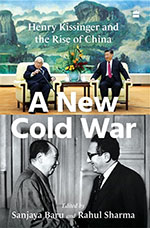As foreign policy cum security experts, academicians and politicians try to understand the current international order and what shape it may take, Sanjaya Baru and Rahul Sharma have brought together 19 essays in their first edition (2021) to coincide with the 50th anniversary of US President Nixon’s historic visit to China in 1971. The essays have been written by scholars, career diplomats and editors of prominent news dailies and news channels.
Nixon’s visit was facilitated by Henry Kissinger, a student of Political Science and practitioner. He came up with the idea that the world required a triangular balance of power with China as the third actor. The US-China reset started by Nixon and Kissinger continued till the Obama administration, establishing diplomatic relations with China (de-recognition of Taiwan as a state), Chinese entry into world financial institutions and the World Trade Organisation (WTO), overlooking its internal politics and decisions that had adverse ramifications for democracy and human rights. This continued till President Trump adopted the geo-economic containment of China line that was promoted by Edward Luttwak, Robert Blackwill and Jennifer Harris by calling for ‘decoupling’ from the Chinese economy in 2020. One set of essays examine the global impact of the US-China reset, while the rest examine this reset from the perspective of select countries.
May 2024, volume 48, No 5

